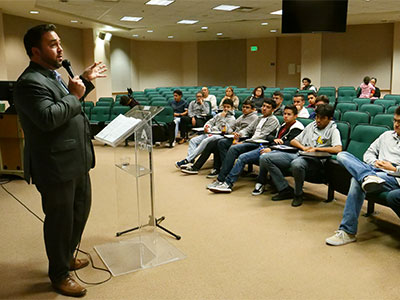
NSHE Vice Chancellor for Community Colleges Nate Mackinnon speaks to MOC students at the Dandini Campus.
Eduardo Escobar is a Junior at Galena High School who always knew he wanted to go to college. His mother, who is a part of the custodian staff at Saint Mary’s Health Center, has taken Eduardo with her to work to help her a few days every week for the past several years. “When I was a little kid, my mom always told me she wanted to buy her a house—that always influenced me to get a college degree one day,” Eduardo said.
He set the bar high: Eduardo has not only dreamed of college, but of going to medical school. “There are a bunch of doctors [where my mom works] who tell me the things they have done, how they got there. That influences me on how to plan out my career,” he said.
Eduardo is a part of TMCC’s Men of Color Mentorship (MOC) Program that will celebrate the graduation of its first cohort this Spring Semester. These students are defying the statistics that young men of color have lower graduation rates than any other demographic. So far, over 90% of MOC students earned a 2.75 GPA or higher, and all of them are on track to earn their high school diplomas.
What the numbers say
Young men who identify as a minority are the least likely to graduate from high school and to continue to post-secondary education. In fact, data from the U.S. Census Bureau's American Community Survey show that in 2012, 7% of all U.S. 16-24 year olds were not enrolled in school and had not earned a high school diploma or equivalency credential. In the same year, the drop out rate was 10.9% for black males, 15% for Hispanic males, and 14.8% for American Indian/Alaska Native males.
Although trends are improving (according to a study released by the National Dropout Prevention Center and Clemson University) young men who identify as a minority still have significantly lower graduation rates than students of other races and ethnicities: for students of color, the percentage range for graduation rates in recent years has been from the high 60s to low 70s, compared to 80% for white students.
The Men of Color Mentorship Program
Recently, the Men of Color (MOC) Mentorship Program received National Recognition by Excelencia in Education, an organization that accelerates Latino student success in higher education by linking research, policy and practice. The MOC program, which is in its third year, recruits 10-20 sophomores each year from each partner high school. So far, partner high schools include: Galena, Hug, North Valleys and Reed High Schools.
Participating students are paired with a mentor who works with a student to establish long and short term goals, steps to achieve those goals, and the necessary life skills to support them. Many mentees want to go to college: mentors work with them to perform well in their high school classes—but also to learn other skill sets, such as how to tie a tie. Mentors, who meet with the students monthly, provide ongoing support academically, but also engage in conversations that challenge students to face the stereotypes they have encountered regarding gender, race and socioeconomic status. In their senior year, mentors educate the student and their families on the college admission process, finding financial aid opportunities and in exploring their professional futures.
Miguel Martinez, who oversees the program, opens a bag of colorful paper, cut into the shape of balloons. “During the first meeting with a mentee, we ask them to write something positive on these balloons-- something that’s happened in their lives that they can look at and that will keep them going. This could be something a parent said, getting a good grade on a test, accomplishing a dream—anything that the student can look at that might inspire them not to give up.”
Learning about success
The program seems to be working. Kervi Ramirez, who is currently a senior at Galena High School (and a student of the first cohort to graduate under the guidance of the MOC program) reports: “College wasn’t really a topic growing up...it was something that lingered in the back of my mind. ‘I want you to try your hardest to be something when you grow up,’ my family would say. I will be the first in my family to go to college...and that would be a great accomplishment. When I got the letter saying I got into TMCC, my family was excited for me. I finally made it.”
Mentorships last through high school graduation, and continue through a student’s first semester in college. Applications for admissions to the MOC program are available in August. For more information, contact the Office of Access, Outreach and Recruitment at 775-673-8236.






